The Problem of Evil 2.2
Is life fair?
Why does one person apparently 'choose' to be 'good' and another person apparently 'choose' to be 'bad'?
According to some philosophers, our actions are either determined by matters such as heredity and environment, or they are a matter of chance.
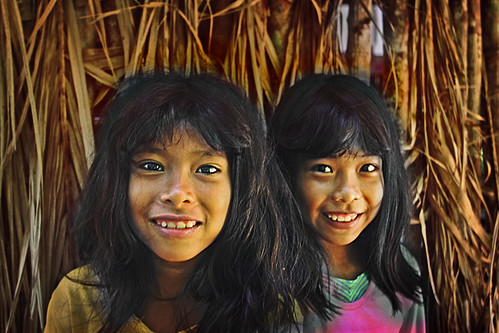
Brazil. By carf
It suits the top criminals to believe that their 'wicked' actions are purely the result of heredity, environment and chance.
But, we do know that when people believe in some kind of 'free will', they do tend to behave better.
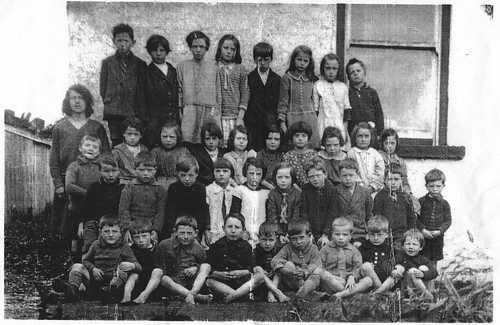
Ireland 1932. By pantufla
Some people have suggested that only one 'entity' has real free will.
And only that one 'entity' is good.
That one person is 'God'.
Or the Tao, or the Force, or the Holy Spirit, or the divine...
Paradoxically, it may be that if we give up our supposed 'free will', we can then follow the will of 'God' (or go with the flow, tune into the Tao, realise that we are part of 'God') and live happily ever after.
 By Alexander Macfarlane
By Alexander MacfarlaneThe Buddhists would say that our sense of being a separate 'self' is an illusion.
Blog: Pleasure and Joy
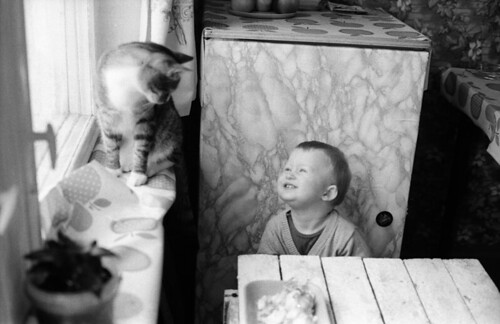
By maria dupovkina
This raises the question of why we are not all tuned into 'God' already.
One can speculate that if God is going to create 'a real world', then, as with a game of golf, there has to be an element of chance.
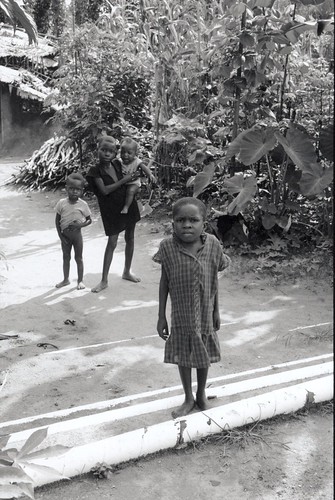
This raises the question of why we are not all tuned into 'God' already.
One can speculate that if God is going to create 'a real world', then, as with a game of golf, there has to be an element of chance.

By IWGIA
Of course, things may always have existed.
The Buddhists would argue that 'God' may not be the best term to use.
Some Buddhists are not keen on the idea of a creator God.
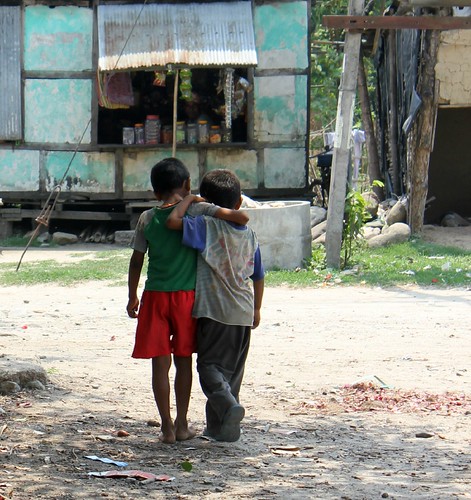
Of course, things may always have existed.
The Buddhists would argue that 'God' may not be the best term to use.
Some Buddhists are not keen on the idea of a creator God.

By © Jamie Mitchell
Some Taoists would argue that every 'thing' and every 'action' is a mixture of 'good' and 'evil'.
"Taoists believe that nature is a continual balance between yin and yang, and that any attempt to go toward one extreme or the other will be ineffective, self-defeating, and short-lived."
What Taoists Believe
The Mohist philosophers in China believed that the purpose of life was universal, impartial love.
Mohism promoted a philosophy of impartial caring - a person should care equally for all other individuals, regardless of their actual relationship to him or her.[48]

Is free will an illusion?
Ruben V Rial-Planas writes
"We can test the problem with my most perfect identical twin: myself!
"Trying to remember the most important decisions I took in my life, I ask myself what I would have done if I had had the possibility to relive again any of the decisive moments of my life - with the same imperfect knowledge and with the same external constraints I had.
"The results of analyzing my perfect twin’s behaviour are, in my opinion, absolutely clarifying: reliving my life would have rendered a life identical to the one I actually lived.
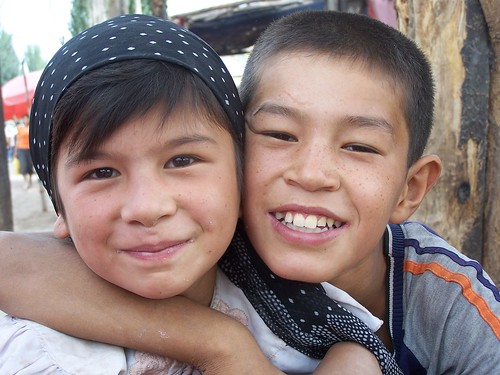
Some Taoists would argue that every 'thing' and every 'action' is a mixture of 'good' and 'evil'.
"Taoists believe that nature is a continual balance between yin and yang, and that any attempt to go toward one extreme or the other will be ineffective, self-defeating, and short-lived."
What Taoists Believe
The Mohist philosophers in China believed that the purpose of life was universal, impartial love.
Mohism promoted a philosophy of impartial caring - a person should care equally for all other individuals, regardless of their actual relationship to him or her.[48]

Is free will an illusion?
Ruben V Rial-Planas writes
"We can test the problem with my most perfect identical twin: myself!
"Trying to remember the most important decisions I took in my life, I ask myself what I would have done if I had had the possibility to relive again any of the decisive moments of my life - with the same imperfect knowledge and with the same external constraints I had.
"The results of analyzing my perfect twin’s behaviour are, in my opinion, absolutely clarifying: reliving my life would have rendered a life identical to the one I actually lived.

By rongpuk
"I can distinguish between two types of events as determinants of every minute fact that occurred in my life.
"Some were the result of conscious decisions, in many cases taken as the result of an evaluation of pros and cons (always with incomplete knowledge of the real situation).
"As it is impossible for me to take stupid decisions (the stupidity defined by myself), I was forced to decide in a determined way, searching the best results.
"In other cases my behaviour was the result of random and/or uncontrolled external factors. In the first case I would repeat my action; in the second, my response would be forced.
"However, if the external random factors would be the same, I also would repeat my action

"I can distinguish between two types of events as determinants of every minute fact that occurred in my life.
"Some were the result of conscious decisions, in many cases taken as the result of an evaluation of pros and cons (always with incomplete knowledge of the real situation).
"As it is impossible for me to take stupid decisions (the stupidity defined by myself), I was forced to decide in a determined way, searching the best results.
"In other cases my behaviour was the result of random and/or uncontrolled external factors. In the first case I would repeat my action; in the second, my response would be forced.
"However, if the external random factors would be the same, I also would repeat my action

By Mayank Austen Soofi
"So, the life of my identical twin entirely repeating my own life shows that I never had a true free will...
"My identical twin shows me the inescapability of Hume’s fork: My actions are either causally determined or random.
"In either case, I am not free."
 By babasteve
By babasteve
Etienne Vermeersch writes (Is free will an illusion?):
"Ruben Rial Planas shows in his 'twin analysis' that he has made two types of decisions in his life:
"Those which were conscious, determined decisions.
"And the others 'the result of random and/or uncontrolled external factors'.
"To my astonishment he concludes: 'In either case I am not free', although he just made a brilliant analysis of the really free decisions: the conscious determined ones."

We choose; we have free will.
"Ultimate reality is consciousness."
According to Amit Goswami, a theoretical nuclear physicist:
"Consciousness is the ground of all being... Our free will is real...
"Reality is not two things - God and the world - but one thing, consciousness."

The problem of evil can perhaps be explained by looking at the equation 0 = +X -X.
When there are created 'things', we get dualism.
In other words, when we have 'hot' we also have 'cold'.
When we have 'good' we also have 'bad'.
We could perhaps see 'God' or the 'Ulimate Reality' as being '0', and the world as being +X -X.
Or we can see 'Reality' as being '0' which can be +X -X.
"The mystics of all the great traditions agree that all distinctions are imaginary and that the Ultimate Nature of Reality is non-dual."
The Mystical Core of the Great Traditions

The Taoists would argue that there is always Yin and Yang.
There is only a problem if there is a lack of balance.
Of course the mystics would also say that Ultimate Reality is much more complicated than we normally imagine, and that Ultimate Reality cannot be described in words.
Dr. Ian Stevenson:
"Twins in Sri Lanka.
"We did testing that showed they were identical, yet they were markedly different in their behaviors and physical appearance.
"One twin began to talk about a previous life as a Sinhalese insurgent, said he was shot by police in April 1971. Anyway, his family laughed at him, so he shut up and nothing could be verified about what he said.
"The older twin talked copiously about the previous life of a young schoolboy. He made several specific statements that ultimately checked out. He said he lived in a place called Balapitiya and traveled by train to a school in another town called Ambalangoda. He made comparisons between the families' property.
"He referred to an aunt, by name, who had cooked chilies for him.
"Perhaps the most astonishing thing was that when the two families met, the boy pointed to some [writing] in a wall that turned out to be the name of the deceased boy he was remembering. The subject said he had made that when the cement was wet. No one in the deceased boy's family had noticed it before."
Conversations/Dr. Ian Stevenson. .
The Self-Aware Universe - Amit Goswami
Jack Schwarz practiced mind over matter.
He could put a long sail-maker’s needle through his arm without injury.
"He also displayed his ability to regulate his body's blood flow by causing the puncture hole in his arm to bleed or stop bleeding at will...
"According to Schwarz, he could also see people’s auras, which allowed him to gauge their physical, emotional, spiritual, and mental conditions."
10 Amazing Examples of Mind Over Matter.
David Seidler "eliminated his cancer through meditation and imagination...
"He spent the two weeks leading up to his surgery envisioning a clean, cream-colored, healthy bladder.
"When Seidler went in for his pre-surgery biopsy, the doctor was stunned to find a distinct lack of cancer..."
10 Amazing Examples of Mind Over Matter.
"So, the life of my identical twin entirely repeating my own life shows that I never had a true free will...
"My identical twin shows me the inescapability of Hume’s fork: My actions are either causally determined or random.
"In either case, I am not free."
 By babasteve
By babasteveEtienne Vermeersch writes (Is free will an illusion?):
"Ruben Rial Planas shows in his 'twin analysis' that he has made two types of decisions in his life:
"Those which were conscious, determined decisions.
"And the others 'the result of random and/or uncontrolled external factors'.
"To my astonishment he concludes: 'In either case I am not free', although he just made a brilliant analysis of the really free decisions: the conscious determined ones."

We choose; we have free will.
"Ultimate reality is consciousness."
According to Amit Goswami, a theoretical nuclear physicist:
"Consciousness is the ground of all being... Our free will is real...
"Reality is not two things - God and the world - but one thing, consciousness."

The problem of evil can perhaps be explained by looking at the equation 0 = +X -X.
When there are created 'things', we get dualism.
In other words, when we have 'hot' we also have 'cold'.
When we have 'good' we also have 'bad'.
We could perhaps see 'God' or the 'Ulimate Reality' as being '0', and the world as being +X -X.
Or we can see 'Reality' as being '0' which can be +X -X.
"The mystics of all the great traditions agree that all distinctions are imaginary and that the Ultimate Nature of Reality is non-dual."
The Mystical Core of the Great Traditions

The Taoists would argue that there is always Yin and Yang.
There is only a problem if there is a lack of balance.
Of course the mystics would also say that Ultimate Reality is much more complicated than we normally imagine, and that Ultimate Reality cannot be described in words.
Dr. Ian Stevenson:
"Twins in Sri Lanka.
"We did testing that showed they were identical, yet they were markedly different in their behaviors and physical appearance.
"One twin began to talk about a previous life as a Sinhalese insurgent, said he was shot by police in April 1971. Anyway, his family laughed at him, so he shut up and nothing could be verified about what he said.
"The older twin talked copiously about the previous life of a young schoolboy. He made several specific statements that ultimately checked out. He said he lived in a place called Balapitiya and traveled by train to a school in another town called Ambalangoda. He made comparisons between the families' property.
"He referred to an aunt, by name, who had cooked chilies for him.
"Perhaps the most astonishing thing was that when the two families met, the boy pointed to some [writing] in a wall that turned out to be the name of the deceased boy he was remembering. The subject said he had made that when the cement was wet. No one in the deceased boy's family had noticed it before."
Conversations/Dr. Ian Stevenson. .
The Self-Aware Universe - Amit Goswami
Jack Schwarz practiced mind over matter.
He could put a long sail-maker’s needle through his arm without injury.
"He also displayed his ability to regulate his body's blood flow by causing the puncture hole in his arm to bleed or stop bleeding at will...
"According to Schwarz, he could also see people’s auras, which allowed him to gauge their physical, emotional, spiritual, and mental conditions."
10 Amazing Examples of Mind Over Matter.
David Seidler "eliminated his cancer through meditation and imagination...
"He spent the two weeks leading up to his surgery envisioning a clean, cream-colored, healthy bladder.
"When Seidler went in for his pre-surgery biopsy, the doctor was stunned to find a distinct lack of cancer..."
10 Amazing Examples of Mind Over Matter.
Ros Barber's new novel Devotion is about God and parallel universes.
Finlay Logan's daughter has died, in a parachute accident.
And Finlay Logan, who is a psychologist, is assessing the sanity of April Smith, a Christian fundamentalist who has blown up a bus.
Finlay says: "There is no fucking God. Because it simply wasn't possible that God the Father would smear your twenty-one-year-old daughter across a field in the Surrey Hills."

Finlay meets Gabrielle Salmon.
Gabrielle Salmon is a scientist who studies consciousness.
She claims that she can help people to connect to God, and thus find peace.
She has managed to reproduce Religious, Spiritual and Mystical Experiences (RSMEs).
Author Ros Barber now presents two parallel universes for Finlay.
Finlay can choose.
We should note that the scientists now tell us that this is possible.

Schrodinger's cat.
Things are made out of tiny 'particles'.
According to the scientists, when you come a cross a 'particle' it does not have a 'fixed state' - until your mind decides what its 'fixed state' will be.
In other words, if you come across Mr Schrödinger's cat lying very still on the grass, the cat is neither dead nor alive - until your mind decides what its 'fixed state' will be.
Let us imagine that you have a very strong feeling that the cat will be alive and well next year.
Then the cat is currently not dead.
The future has affected the present.
dailymail - Can the past change the FUTURE?

animalfair.com
Christians believe that things go better when you tune into the Holy Spirit.
The Taoists would call the Holy Spirit the Tao.
When you are tuned in, the cat is not dead.

Some Taoists and Christians and others believe that bliss can be achieved when:
1. You believe that, when tuned in, life works out for the best.
2. You are compassionate
3. You are moderate (Avoid extremes)
4. You are humble (The selfish ego is switched off)
5. Everything is in balance
6. Being tuned into the Holy Spirit or the Tao or whatever you want to call it, you go with the flow.
(You are not battling against the Holy Spirit or Tau)
7. You avoid the use of force; you avoid pitting your will against the universe.

Eventually the cat will die, but it will continue in the Spirit.

"It stretches our own humanity to love a child who is less than perfect... And that is an important lesson for us.'" (Dr. Frank Oski)
Christians refer to both 'spirit' and 'body'. [4]
There is a belief that spirits inhabit and animate beings.
The body is like a computer.
The spirit is like the person who operates the computer.
The New testament refers to evil spirits.
Luke 11:2 "When the unclean spirit goes out of a man, it passes through waterless places seeking rest, and not finding any, it says, 'I will return to my house from which I came.'"
Mark 16:9 "He first appeared to Mary Magdalene, from whom He had cast out seven demons."

How might a spirit achieve bliss?
Lao Tzu taught that we should eliminate all that is dark and negative in ourselves.
Taoist ethics
Buddhism refers to the need for loving kindness.
Buddhist ethics
Christians refer to tuning in to the Holy Spirit.
The Holy Spirit can be found in Islam, and in Hinduism and in Buddhism.
Recently we referred to Kim Noble, who has more than one 'personality' or 'spirit'.
Kim Noble , 50, has dissociative identity disorder (DID), which means that she has scores of different personalities.
"There's Judy the teenage bulimic, Salamoe the devout Catholic, Ken who is gay and over 100 more."
Kim Noble: The woman with 100 personalities.
Is each of these 'personalities' a 'spirit'?

Recently I met Bob, whose 'spirit' could see his body being operated on.
Bob had a heart attack and was taken unconscious to a hospital.
While in the operating theatre, at 3am, Bob found himself looking down at his body.
He could also see his late father, who told him that he was going to be OK.
At 3am, Bob's mother, who was at home, had a vision of her late husband.
It would seem that our spirit can exist without the body.

Carl Jung believed that life has a spiritual purpose.[65][66]
Our main task, he believed, is to 'transform' our spirit.
"Based on his study of religions, Jung believed that this 'journey of transformation' is at the heart of all religions.
"It is a journey to meet the self and at the same time to meet the Divine.[67]
"Jung wrote about the transformation of the impure soul (lead) to perfected soul (gold).[19]
Jung influenced quantum mechanics with the idea of synchronicity.
"Jung wrote that images found in dreams could be helpful in recovering from trauma and emotional distress.
"He often drew, painted, or made objects and constructions at times of emotional distress, which he recognized as more than recreational." [14]


0 Comments:
Post a Comment
Subscribe to Post Comments [Atom]
<< Home